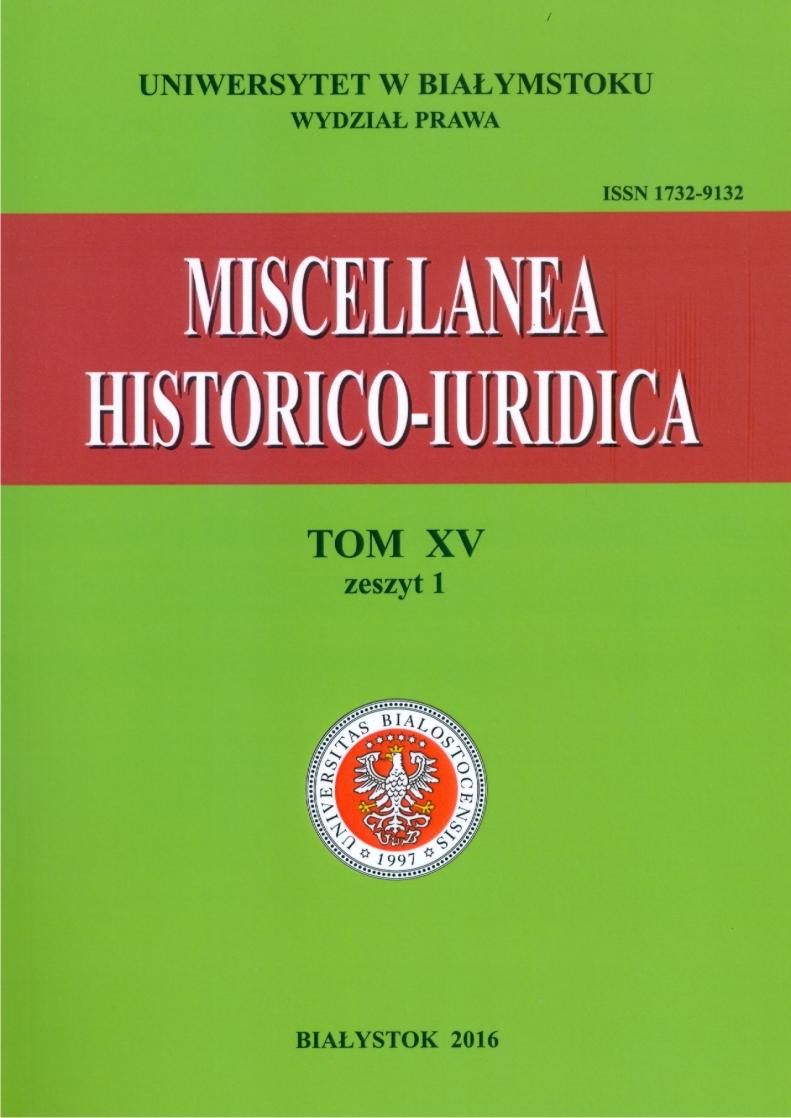Whose child, whose? Some remarks on the origin of a child against surrogacy contracts
Keywords:
surrogacy, contract of surrogacy, surrogate mother, intended parent, genetic mother, biological mother, fatherAbstract
Surrogacy is a tool to fulfil anyone’s need and yearning for a child. Next to adoption, it provides the only additional way to be a parent, opposite to adoption – it makes an individual capable of having a genetically related child. However, since the beginning of application of methods of artificial procreation and surrogacy itself in the 70s, 80s of the twentieth century, the need for regulation of surrogacy, the legality of the contract is still a source of controversies in courtrooms as well as in scientific discourse. Unfortunately, usually the consequence of a contract, even regarded as invalid, is childbirth. The discussion about surrogacy is therefore not only scientific in its nature – it refers to a living human being and his legal and family status. A few years ago I wrote about surrogacy in the US, in order to show the complexity of the problem in a country where there is a multiplicity of regulations – from its prohibition, through the lack of references in the law, to a clear, pronounced acceptance of contracts and surrogacy itself. Today, I am coming back to the issue in order to make one of the most controversial American cases the background for reflections on the realities of today’s Polish law.
References
Illinois Gestational Surrogacy Act, 750 Ill. Comp. Stat. 47/1-75 (2006).
Illinois Parentage Act (750 ILCS 46/), http://www.ilga.gov/legislation/ilcs/ilcs5.asp?ActID=3638&ChapterID=59.
Minnesota Statutes, https://www.revisor.mn.gov/statutes/.
Ustawa z dnia 23 kwietnia 1964 r. – Kodeks cywilny (Dz.U. 2016, poz. 380).
Ustawa z dnia 25 czerwca 2015 r. o leczeniu niepłodności (Dz.U. 2015, poz. 1087).
Ustawa z dnia 25 lutego 1964 r. – Kodeks rodzinny i opiekuńczy (Dz.U. 2015, poz. 2082).
Ustawa z dnia 28 listopada 2014 r. – Prawo o aktach stanu cywilnego (Dz.U. 2014, poz. 1741).
Doe v. Doe, 710 A.2d 1297 (Conn. 1998).
Higgins v. Brunswick Corp., 395 N.E.2d 81, 85 (Ill. App. Ct. 1979).
In re Application of Saxton, 309 N.W.2d 298, 301 (Minn. 1981).
In re Baby M, 217 N.J. Super. 313 (1987), rev’d in part, 525 A.2d 1128, 1988 W L 6251, Slip Op A-39-87, decided Feb 3, 1988.
In re Marriage of Gorman, 671 N.E.2d 819, 825 (Ill. App. Ct. 1996).
In re Paternity & Custody of Baby Boy A., Minnesota Court of Appeals Unpublished Opinion, Justia US Law, http://law.justia.com/cases/minnesota/court-of-appeals/2007/opa070452-1211.html.
In re Paternity & Custody of Baby Boy A., No. A07-452, 2007 WL 4304448 (Minn. Ct. App. Dec. 11, 2007), Hennepin County District Court File No. 27-PA-FA-05-278S, http://www.lawlibrary.state.mn.us/archive/ctapun/0712/opa070452-1211.htm.
Inland Prods. Corp. v. Donovan, Inc. 249 Minn. 387, 390, 82 N.W.2d 691, 693 (1957).
Melena v. Anheuser-Busch, Inc., 847 N.E.2d 99, 109 (Ill. 2006).
Myer v. Nebraska, 262 U.S. 390, 399 (1923).
Pierce v. Society of Sisters, 268 U.S. 510 (1925).
Prince v. Massachusetts, 321 U.S. 158 (1944).
Santosky v. Kramer, 455 U.S. 745, 753 (1982).
Stoltze v. Stoltze, 66 N.E.2d 424, 428 (Ill. 1946).
Tadros v. Kuzmak, 660 N.E.2d 162, 170 (Ill. App. Ct. 1995).
Wise v. Midtown Motors, Inc., 231 Minn. 46, 53, 42 N.W.2d 404, 408 (1950).
Bagan-Kurluta K., About surrogacy agreements against background of American experiences, „Białostockie Studia Prawnicze” 2010, z. 8.
Bychkov Green S., Interstate Intercourse: How Modern Assisted Reproductive Technologies Challenge the Traditional Realm of Conflicts of Law, „Wisconsin Journal of Law, Gender & Society” 2009, nr 24.
Gostin L., A Civil Liberties Analysis Of Surrogacy Arrangements, „Journal of Contemporary Health Law & Policy” 2000-2001, nr 17.
Instytucje prawa rodzinnego, red. J.M. Łukasiewicz, Warszawa 2014.
Jędrejek G., Kodeks rodzinny i opiekuńczy. Pokrewieństwo i powinowactwo. Komentarz do art. 61(7)-144(1), Lex 2014.
Krekora-Zając D., Prawo do poznania matki biologicznej według krajowego prawa rodzinnego, „Studia Prawnicze” 2014, z. 1.
Pędziałek-Kunert E., Rozważania o pomocy sądu rodzinnego i rodzinnego kuratora sądowego w zakresie ochrony dziecka i rodziny, „Rodzina i Prawo” 2016, nr 36.







